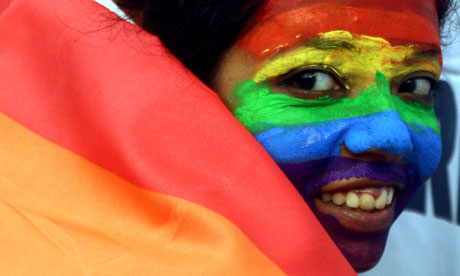I was personally very impressed and moved by President Obama's decision to come out openly and vocally in support of same-sex marriage. For all the guff we throw at him, and not withstanding the obvious political calculations that came along with the decision, his move was a courageous and truly historic gesture befitting the expectations that came along with his ascendancy to the presidency.
The cultural waters in terms of gay rights continue to move and shift in profound and irreversible ways.
I see this as well in the religious communities that I am part of. Recently, my friend Bowie Snodgrass, who is one of the executive directors of the excellent Interfaith community Faith House here in Manhattan, presented a sampling of the liturgy, song, and scripture she and others in the Episcopal Church have been developing for a same-gender blessings marriage ceremony. (For more information, click here to visit the Episcopal Church's "Same-Gender Blessings Project")
Still, within my own tradition (the Gaudiya Vaisnava tradition of Hinduism), and within its contemporary cultural expressions, I feel a certain hesitancy to be so supportive of gay rights. Within my own heart and conviction, there is no conflict. But I wonder how I will be perceived by my immediate and extended religious community. Nevertheless, I use this platform on The Huffington Post to bring this conflict into a brighter light, because I think it is part of the larger question of establishing and defining the relevancy of my tradition in the world today.
It is an unfortunate aspect of my experience within the Vaisnava tradition that I have experienced prejudice towards the gay community. Some of this prejudice has been overt, some of it simply a matter of cultural conditioning and unfamiliarity, but in either case, it has always made me quite uncomfortable. I had many gay and lesbian friends when I was an undergrad at the University of Michigan. I imagine I will have many gay and lesbian friends when I began grad school at Union Theological Seminary in the fall. I am naturally comfortable with people of this sexual persuasion, because of the simple fact that, beyond sexual preference, I see no difference between them and me.
Therefore when I encounter prejudice against gay people and gay culture, even if it is not with the intent of malice, it feels abhorrent in the fiber of my being and spirituality.
I feel comforted knowing there are many people of faith who feel the same way I do, and who are trying to come to grips and understand why the prejudice of homophobia can never be supported in any kind of genuine spiritual way. As always, I look to support from the timeless scriptures of the Vedas, the fount of universal wisdom. For example, in the Bhagavad-Gita, Krishna states:
The humble sages, by virtue of true knowledge, see with equal vision a learned and gentle brāhmaṇa, a cow, an elephant, a dog and a dog-eater (outcaste).
From this passage we understand a very elevated spiritual principle that calls out to our everyday experience. The fact of the matter is that prejudice of any kind has no spiritual foundation. We are called as spiritual people to apply the principles of equality, and to understand how these principles of equality can be applied in the secular world in a common-sense way, so that people do not unnecessarily suffer because of who they are, and so they can be encouraged to understand their real spiritual nature, beyond any conceptions of the physical body.
One may make an argument that gay marriage is not supported by scripture or tradition, but is homophobia ever supported by scripture or tradition? Forgive my ignorance per se if this kind of prejudicial support exists, but even within the scriptural evidence of Hindu antiquity there is plenty to support a nuanced and inclusive culture towards people of same-sex persuasion. To explore such an example, I suggest taking some time to read an excerpt from the book "Tritiya-Prakriti: People of the Third Sex-Understanding Homosexuality, Transgender Identity and Intersex Conditions Through Hinduism" by Amara Das Wilhelm, which is available at the website of GALVA (The Gay And Lesbian Vaisnava Association).
In his book, Wilhelm explores the reality of the "third sex" (tritiya-prakriti) and its various permutations as we know them today in the LGBTQ community. He reveals how individuals of the "third sex" naturally fit into traditional Hindu/Vedic culture, and how they were not excluded from traditional social customs like marriage and religious customs as well. It was an enlightening read for me, and I imagine it might be for you as well.
In future editions of this blog, I want to continue to explore the issue of prejudice against the LGBTQ community within my own tradition, and how these issues relate to and expand outwards within the spiritual quilt of our humanity. I do no want to shy away from this conflict as I see it, even if it brings upon me misunderstandings and doubts from others.
